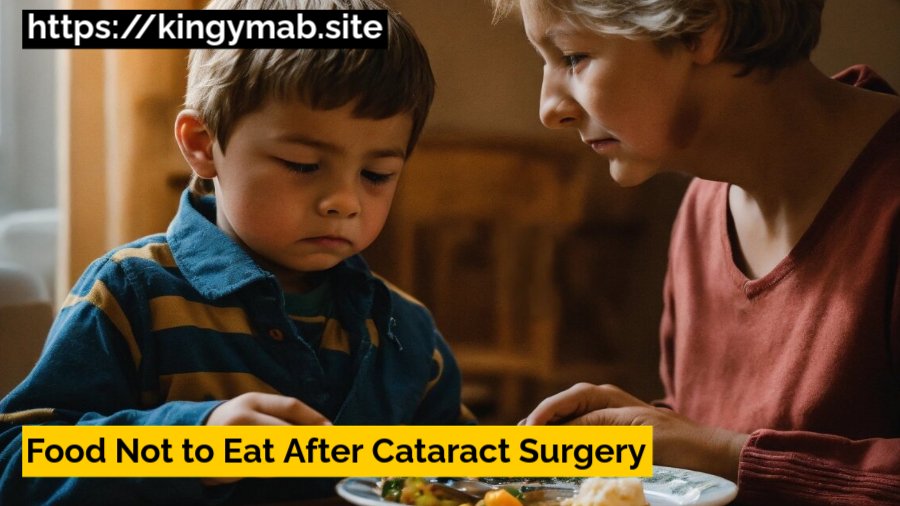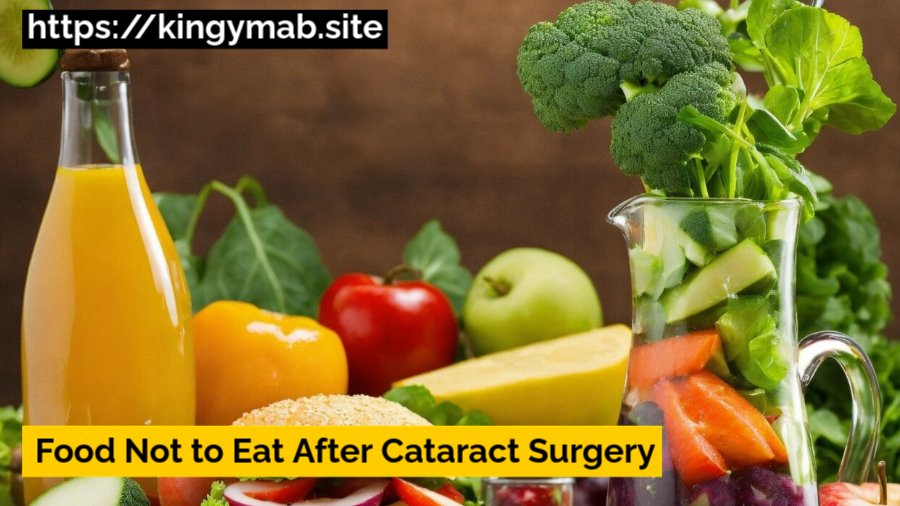After I had cataract surgery, I quickly learned how important it is to be mindful of my diet. What I eat can really impact my recovery, and there are definitely some foods I need to avoid. In this article, I’ll share what I’ve learned about the food not to eat after cataract surgery, and I hope it helps you too!
Key Points
- Avoid inflammatory foods: Certain foods can increase inflammation, slowing down recovery.
- Focus on nutrient-rich options: A balanced diet promotes healing and supports eye health.
- Hydration is key: Staying hydrated aids in recovery and overall health.

Foods to Avoid After Cataract Surgery
Understanding which foods can negatively affect my recovery has been eye-opening. Here are some key categories:
| Food Type | Why to Avoid |
| Processed foods | These often contain unhealthy fats and sugars. |
| Sugary snacks | High sugar levels can trigger inflammation. |
| Refined carbohydrates | Foods like white bread lack essential nutrients. |
| High-sodium foods | Can raise blood pressure and cause fluid retention. |
While recovering from cataract surgery, I realized that some foods I usually enjoyed might not be the best choices for my healing process. Let me share what I’ve learned about refined carbs, sugar, and alcohol—they were eye-openers for me (no pun intended!).
- Refined Carbohydrates
I didn’t think much about refined carbs like white bread, pasta, chips, or cereals before, but during recovery, I learned they could spike my blood sugar. This isn’t great because high glucose levels can harm blood vessels in the eye, slowing down recovery. Cutting back on these foods wasn’t easy at first, but I replaced them with whole grains, and it made a difference in how I felt. - Sugary Foods
I have a bit of a sweet tooth, so this one was tough for me. High sugar intake can actually slow down the healing process after cataract surgery. Once I understood this, I swapped sugary snacks for fruits like berries and apples, which not only satisfied my cravings but also supported my recovery. - Alcohol
I love winding down with a glass of wine, but I had to hit pause on that during my recovery. Alcohol can dilate blood vessels around the eye and increase inflammation, which can interfere with healing. So, I stuck to hydrating with water and herbal teas instead. It wasn’t a huge sacrifice, especially knowing it helped me heal faster.
The Impact of Inflammation on Recovery
I’ve realized that inflammation can really delay healing, so it’s important to understand its role.
- Role of inflammation in the body: While inflammation is a natural response, too much of it can slow down my recovery.
- Foods that promote inflammation: Processed foods, fried foods, sugary snacks, high-sodium foods—all contribute to increased inflammation.

When I was recovering from cataract surgery, I also discovered a few more things that surprised me:
- High-Sodium Foods
I learned that foods with too much salt could raise blood pressure and increase inflammation. This isn’t great for recovery since inflammation can slow down the healing process. I started checking food labels and cutting back on salty snacks like chips and processed soups. Trust me, it made a difference! - Spicy and Oily Foods
As much as I love spicy curries and fried snacks, I had to give them a break. Spicy and oily foods can cause discomfort and raise blood pressure, which isn’t ideal during recovery. It was tough at first, but I stuck to milder, lighter meals, and it really helped me feel better. - Tobacco Products
I don’t smoke, but if you do, it’s something you might want to avoid after surgery. Smoking or using tobacco can delay healing and even increase the risk of complications. I also made sure to steer clear of secondhand smoke during my recovery. - Preserved and Pickled Foods
This one caught me off guard. Foods like pickles and preserved items are often loaded with sodium and additives that can lead to more inflammation. I swapped out my usual pickles and processed condiments for fresh options, and it felt like a small but important step toward recovery.
Importance of a Balanced Diet
Eating a balanced diet is essential for my healing process.
- Nutrients that support recovery: Vitamins C and E, zinc, and omega-3 fatty acids are vital for recovery.
- Examples of beneficial foods: I try to incorporate fruits, vegetables, lean proteins, and healthy fats into my meals.
| Nutrient | Food Sources |
| Vitamin C | Citrus fruits like oranges |
| Omega-3 fatty acids | Fatty fish like salmon |
| Zinc | Beans, nuts, whole grains |
Recommended Nutrients for Eye Health
There are certain nutrients that play a key role in eye recovery.
- Vitamin C and its sources: I love snacking on oranges and strawberries for that vitamin boost.
- Omega-3 fatty acids and their benefits: Eating fish like salmon helps reduce inflammation.
- Zinc-rich foods for immune support: Foods such as beans and nuts provide essential zinc.
Hydration After Surgery
Staying hydrated has been critical for my recovery.
- Recommended water intake: I aim for at least 2–3 liters of water daily.
- Hydrating food options: Fruits like watermelon and cucumbers are great choices since they have high water content.
Timing Your Meals Post-Surgery
Knowing when to eat is just as important as what to eat.
- Light meals right after surgery: I started with easy-to-digest foods as soon as I felt comfortable.
- Gradually reintroducing regular foods: Slowly incorporating more complex meals helped me feel better.
Specific Foods to Avoid
Here’s a detailed list of foods I’ve decided to steer clear of:
- Fried foods and their effects on inflammation: Foods like fried chicken contain unhealthy fats that can worsen inflammation.
- Alcohol consumption guidelines post-surgery: I’ve limited alcohol intake for at least a week; it can dehydrate my body and interfere with medications.
Benefits of Anti-inflammatory Foods
Incorporating anti-inflammatory foods has been beneficial for me.
- Leafy greens and their benefits: Spinach and kale are rich in antioxidants that help combat inflammation.
- Fruits high in antioxidants: Berries are excellent choices for their anti-inflammatory properties.
Supplements That May Help Recovery
I’ve considered adding some supplements to support my healing:
- Lactoferrin and its role in eye health: This protein helps with dry eyes post-surgery.
- Omega-3 supplements for dry eyes: They may alleviate symptoms associated with dry eyes after surgery.
Lifestyle Changes for Better Recovery
Making some lifestyle adjustments has enhanced my recovery process.
- Importance of quitting smoking: Smoking increases the risk of complications post-surgery, so I made the decision to quit.
- Managing stress during recovery: Engaging in activities like yoga or meditation has helped me stay calm and focused.

Also Read Our Article On Nutrition & Diet: Calcium, Magnesium, and Zinc: Essential Minerals for Health
FAQs
What are the best foods to eat after cataract surgery?
I’ve found that eating nutrient-rich foods like green leafy vegetables, fruits high in vitamin C, and omega-3 fatty acids is really helpful. These foods help reduce inflammation and support healing.
How long should I avoid certain foods after surgery?
It is advisable to avoid inflammatory foods for at least a few weeks post-surgery or as directed by my healthcare provider. This helps prevent complications during recovery.
Can I drink alcohol after cataract surgery?
I’ve learned that it’s best to limit alcohol intake for at least a week after surgery. Alcohol can dehydrate my body and interfere with the effectiveness of medications used during recovery.
What food should you avoid after cataract surgery?
After my cataract surgery, I learned that I should avoid processed and refined foods, sugary snacks, and anything high in sodium. These foods are exactly the food not to eat after cataract surgery, as they can increase inflammation and slow down the healing process. I also stayed away from spicy and oily foods since they could elevate my blood pressure and cause discomfort.
Can you eat bananas after cataract surgery?
Yes, I enjoyed bananas after my surgery! They’re easy to digest, packed with potassium, and give me energy without causing any inflammation. They were a great addition to my recovery diet.
Can I eat eggs after cataract surgery?
I included eggs in my diet after surgery, and I found them to be a great source of protein. They’re also rich in nutrients like lutein and zeaxanthin, which are great for eye health and helped with my recovery. Unlike some of the food not to eat after cataract surgery, eggs provided essential nutrients without causing any inflammation or slowing down my healing process.
What should you not drink after cataract surgery?
I made sure to avoid alcohol and sugary drinks, as they can interfere with the healing process and dehydrate my body. Instead, I stuck to water, herbal teas, and fresh juices to stay hydrated and help my eyes heal.
How many days rest is needed after cataract surgery?
For me, I took it easy for 1–2 days after the surgery, but I made sure to avoid strenuous activities for about a week. I followed my doctor’s advice to ensure I healed properly and didn’t put unnecessary strain on my eyes.
Which fruit is best after cataract surgery?
I loved eating citrus fruits like oranges and grapefruits after my surgery. They’re rich in vitamin C, which helped reduce inflammation and speed up my recovery.
What is the biggest complaint after cataract surgery?
For me, the most common issues were dry eyes, mild discomfort, and blurry vision right after the surgery. But these symptoms improved after a few days, so I wasn’t too worried. Along with following my doctor’s instructions, avoiding certain food not to eat after cataract surgery helped reduce inflammation and supported my recovery process.
Which fruit is a miracle for eyesight?
I found that blueberries are amazing for eye health. Packed with antioxidants and vitamin A, they helped protect my eye tissues and even supported my recovery after surgery.
What is the fastest way to recover from cataract surgery?
To recover quickly, I made sure to follow my doctor’s instructions, avoid heavy lifting, and eat a nutrient-rich diet, all while being mindful of the food not to eat after cataract surgery. Staying hydrated and getting plenty of rest really helped me feel better. I also protected my eyes from dust and sunlight by wearing sunglasses when I went outside.
Conclusion
Maintaining a healthy diet after cataract surgery has been key to my smooth recovery.
- Recap the importance of avoiding certain foods
- Highlight the benefits of a balanced diet
- Encourage consultation with healthcare professionals regarding dietary restrictions
This version integrates both pieces of information effectively throughout the blog while ensuring clarity for readers!





